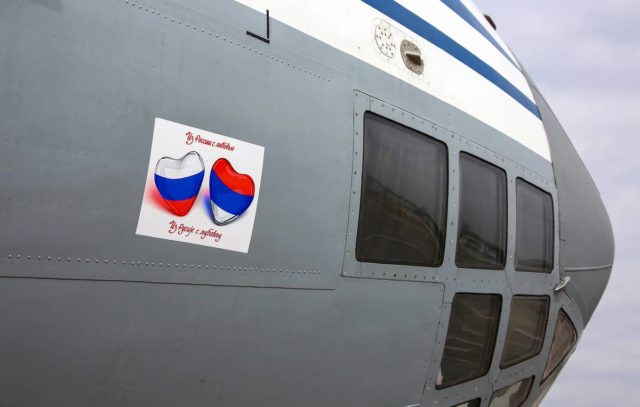
Moscow Using Pandemic to Shore Up Alliance With Serbia Against NATO and China
Publication: Eurasia Daily Monitor Volume: 17 Issue: 50
By:

Moscow’s dispatch of medical equipment and expertise abroad during the coronavirus pandemic has been anything but disinterested. Instead, it is clearly intended to serve Russia in a variety of ways. The Kremlin is using this aid to shore up alliances, as in the case of Serbia; pressure Western countries, including the United States, to drop sanctions (see EDM, April 13); provide cover for Russian intelligence operations, as in Italy (see EDM, April 8); and even to help the country’s balance of trade by opening up new markets for Russian products. However, the re-affirmation of Russia’s military alliance with Serbia may be the relationship in which Moscow has achieved the most, given both the size of its effort there and the gratitude of the Serbs for what Moscow has done. Russia has taken these actions not only as a means to counter the North Atlantic Treaty Organization (NATO) but also because Chinese assistance to Serbia had called into question Moscow’s unquestioned dominance in this central Balkan country and changed the geopolitical map of the wider region.
Chinese assistance to Serbia in response to the pandemic began on March 21, two weeks before the first Russian aid arrived. Beijing sent an Airbus A330 plane filled with masks and protective clothing. Just before its arrival, Serbian President Aleksandar Vučić told the Chinese ambassador that “it has turned out that without you, the Chinese, Europe will hardly be able to defend itself, and we are not hiding how much we cannot do and are not in a position to do without the assistance of China and our Chinese brothers.” This is the kind of language Moscow is used to hearing from the Serbs about Russia and Russians (Novaya Gazeta, April 11).
Vučić said at the time that he had asked China for assistance because the European Union, instead of helping its eastern neighbors, was focused entirely on helping its own members, thus freezing out countries like Serbia (an EU aspirant). Notably, Republika Srpska (Serb Republic—the ethnic-Serb-dominated northern federal entity of Bosnia-Herzegovina) was similarly turned down by Muslim countries and left to its own devices (Novaya Gazeta, April 11).
Quickly, the Serbian president asked his Russian counterpart, Vladimir Putin, for assistance as well. Subsequent Russian assistance, as Serbia’s defense minister underlined, came as a result of an accord reached by “the two supreme commanders,” operating on the basis of their “military-technical agreement.” The aid deal “helped our army to become stronger” and our skies “more defensible because the Russian Federation and its army today are helping us to fight against the terrible virus, [which causes] COVID-19.” Thus, even though Russian assistance came later than the Chinese, it has been far more massive and involves large numbers of military personnel. Russian troops have worked with the Serbian military to disinfect buildings, organize treatment centers, and expand cooperation with local commanders, not only in the capital city but in regional centers and even in smaller villages (Politexpert.net, April 12; Izvestia, April 14; Olimpiada-tokio2020.ru, April 10).
These developments, Moscow’s Novaya Gazeta suggests, are part of what people in the Balkans are now calling “the diplomacy of protective masks.” So far, Moscow has gained the upper hand because Brussels has receded and Beijing has not built on its initial moves. But the Chinese move and its positive reception in Belgrade shows that geopolitics in the Balkans is no longer just between Russia and the West. Now, competition in the region is a triangle involving Russia, China and the West, and is thus more unstable and more unpredictable. China can and likely will continue to intervene in the region, while Russia will presumably work just as hard to block Beijing as it has struggled to keep out NATO.
Three critical aspects of these developments should be underscored. First, the Serbs apparently would have preferred to deal with the Europeans; but, when the EU did not respond, they turned to the East, to Russia and China. If the pandemic contributes not only to a greater focus on nation-states and their self-interest in the West, that will open the way for more moves of the kind Moscow and Beijing have made in Serbia, setting the stage for a new competition between the two.
Second, while the Chinese are ostensibly applying a purely humanitarian approach, the Russians have adopted an overtly military-centric one. Moscow’s assistance to Serbia has been controlled from the start by the military, and Russian soldiers have been integrated into Serbian operations against the pandemic. Once the coronavirus threat eases, it seems likely the Russian military presence will nonetheless remain. Indeed, the Russian military newspaper Krasnaya Zvezda is already speaking in expansive terms about “the united front” of the two countries against not only “the new pandemic” but other challenges as well (Krasnaya Zvezda, April 10).
Finally, as Krasnaya Zvezda reports, Putin has directed the Russian Ministry of Defense to adopt a similar approach in Bosnia-Herzegovina (Krasnaya Zvezda, April 10), an indication Moscow views the use of the military in this way to be the most effective strategy to advance its interests. To be sure, Russia’s civilian emergency services system is less developed than its military. If Moscow wanted to move quickly, it likely had little choice but to deploy the Russian Armed Forces. But now that it has, the Kremlin seems committed to building on to its perceived success, hoping it can further shore up Russian power in Belgrade and the Balkans against not only the West but against China as well.



